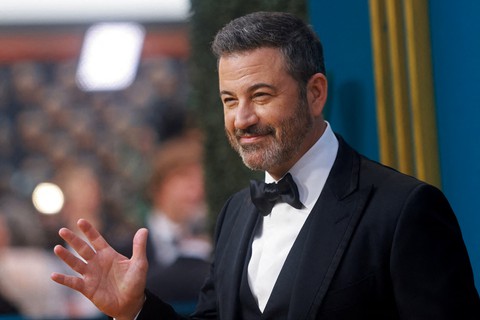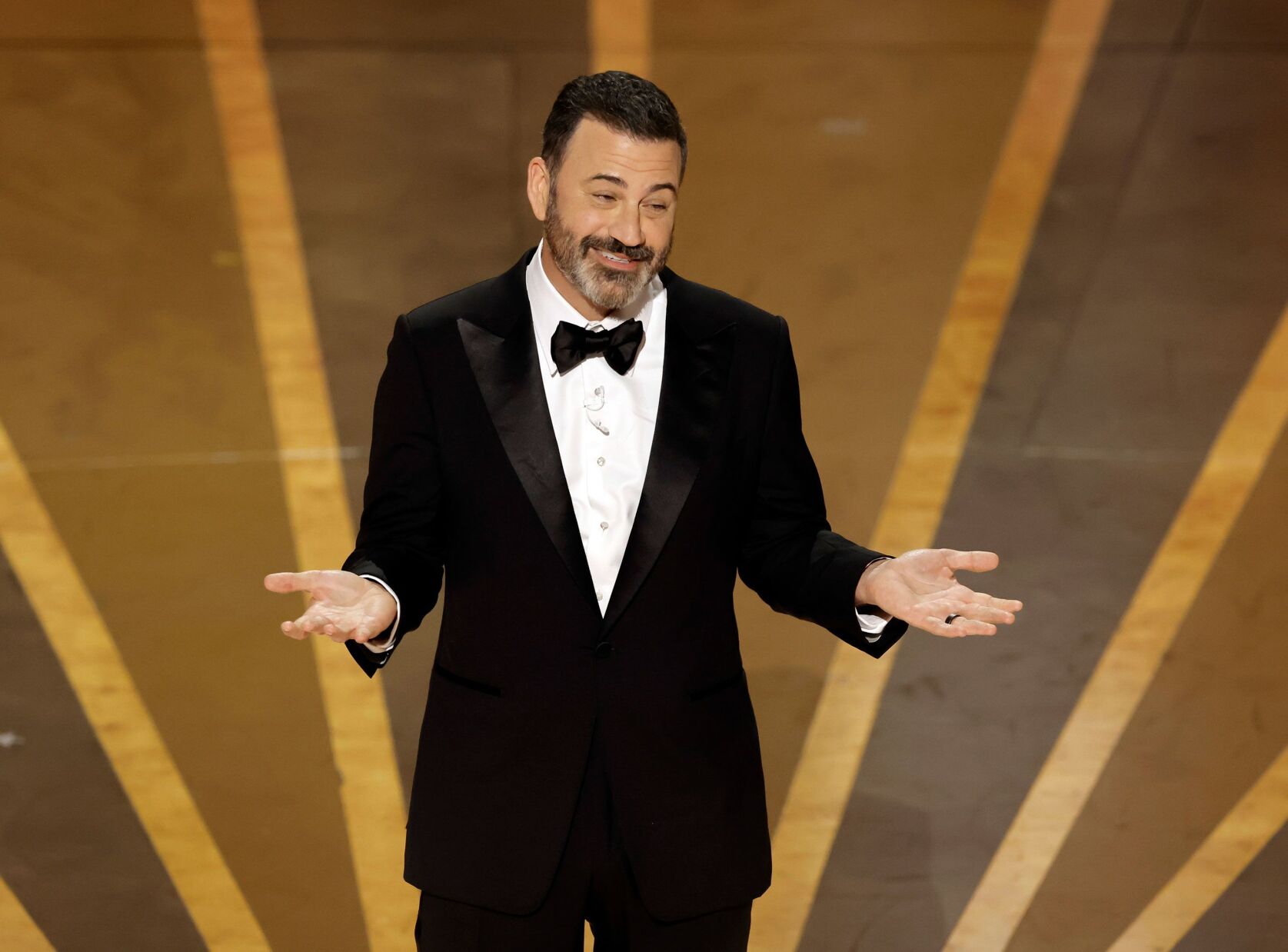Two days after ABC suspended Jimmy Kimmel Live! on September 17, a short clip surfaced online. It wasn’t broadcast, it wasn’t polished, and there was no audience applause, no monologue, no neon glow of late-night. Instead, it was raw: a shaky recording from a rehearsal space, the kind of footage never meant to leave the building. The camera lens quivered as someone adjusted it, the red REC light blinking like a silent accusation. Chairs scraped, clipboards snapped, a cough was swallowed mid-breath. And then came long, unbearable silence.
Jimmy Kimmel sat at the center of it all. Not on a glittering stage, but in a bare room with half-dim lights, water bottles stacked nearby, cables snaking across the floor. For decades, he had been the jester of late-night, the man who could turn outrage into laughter and scandal into a joke. But here, stripped of the spotlight, he was different. His grin was gone, his jaw clenched as if carved from stone, his eyes locked forward. The comedian America knew had vanished, replaced by someone ready to confront, not entertain.
The suspension had been officially justified by ABC as a response to Kimmel’s remarks on Charlie Kirk, citing “standards” and “responsibility.” But behind the scenes, insiders hinted at a more complex story: regulatory pressure, nervous affiliates, and advertisers quietly threatening to pull campaigns. Group chats among staffers lit up with speculation, and journalists tweeted, “The silence is the loudest thing right now.” The industry understood the unspoken message: one host down had been a signal, a pattern.

For seventy-two hours, Kimmel said nothing. No tweets. No public comment. No monologue reference. Just silence. According to a producer close to the team, it was strategic. “He was watching,” the producer said. “He wanted to see how far it spread. And it did.” On the studio floor, writers described the mood as restless. Producers whispered phrases like “contingency language” and “ad-friendly restructuring.” Colbert’s recent cut-to-black moment during a politically charged monologue had already set the precedent. Now, Kimmel’s absence amplified the tension.
Monday night, 11:34 PM. The lights came up. No band, no cold open, no familiar Kimmel smile. He walked in alone, sat down, and stared straight at the camera. Eight minutes passed as he spoke with measured precision. Not a single name was mentioned, not a network blamed, not a political figure called out. His words carried intent, weight, and quiet defiance.
“They say nothing’s decided. But decisions don’t always come with signatures,” he began. “I’ve read the articles. I’ve seen the messages. You think it’s a rumor until it shows up in the edit bay. What I heard wasn’t a threat. It was a pattern.”
The response was immediate. Clips flooded Reddit, X, and TikTok, trending under #KimmelNext within two hours. Users captioned the videos with “It’s not about jokes anymore,” “He just explained how democracy ends—quietly,” and “They canceled Colbert. Who’s next?” One wrote, “They wanted silence. He gave them something worse: reflection.”

The implication was clear: Kimmel was not only defending himself but drawing attention to the broader vulnerability of political satire. Late-night TV, long a battleground for cultural critique, now faced the prospect of systematic pressure. Writers and producers reportedly continued creating content, but morale was fragile. A whiteboard of future segments was wiped clean, replaced with a single haunting question: “What if we can’t say what we mean?”
Inside ABC, staffers described the atmosphere as suffocating. Every phone call, every step across the studio floor felt surveilled. The red REC light in the control booth still blinked, capturing every detail. Executives attempted to reassure affiliates, but leaked emails and vague statements only fueled speculation. Advertisers reacted cautiously; one paused a major placement without announcing it publicly. The ripple effect spread through departments, meeting rooms, and conference calls, leaving the network scrambling to regain control.
Observers quickly drew parallels to Stephen Colbert’s abrupt cut-to-black moment. While officially explained as a technical issue, insiders wondered if it had been a warning—a prelude to the current chaos. If Colbert had been silenced, and now Kimmel confronted the same pressures, the question arose: who might be next? Names circulated in hushed discussions: Jimmy Fallon, Seth Meyers, John Oliver, even Bill Maher. It was no longer speculation; it was fear, a palpable tension gripping the late-night industry.
Media analysts coined a term: the “late-night cleanup.” It wasn’t outright censorship, but a pattern of quiet removals, preemptive silences, and strategic suspensions. The nine words Kimmel spoke in the rehearsal—“You can cancel me. You can’t cancel the truth”—became a rallying cry. Delivered calmly, without laughter or sarcasm, they carried defiance and clarity that reverberated far beyond the room.
The clip, though raw and unpolished, spread across the internet, dissected frame by frame. Some viewers cheered: “Finally, someone said it.” Others condemned him: “He knew exactly what he was doing.” Regardless, the impact was undeniable. It marked a fracture in the late-night ecosystem, signaling that even subtle defiance could shatter the illusion of control.

By the end of the week, ABC’s internal panic deepened. Affiliates demanded written clarification. Emails flooded in with blunt subject lines like, “Need clarity within 24 hours.” In sales departments, scheduled placements turned red in spreadsheets, and brand representatives requested assurances before continuing contracts. The network was scrambling, trying to manage both perception and reality.
For late-night insiders, Kimmel’s measured defiance was a wake-up call. It was no longer about entertainment. It was about authority, influence, and who gets to speak. One analyst summed it up bluntly: “This is no longer about comedy. This is about who gets to speak—and who doesn’t.”
The clip lasted less than a minute. Nine words. Yet its consequences rippled across networks, production floors, living rooms, and social feeds. It challenged the industry’s assumption that late-night satire could be controlled or contained. If this was the opening act of a “cleanup,” then Kimmel had shown the power of deliberate, calculated resistance. His silence, his measured tone, his stare into the camera—these were acts louder than any monologue, more incisive than any joke.
The question remained: if Kimmel could deliver truth so quietly yet so forcefully, who among the remaining hosts would dare to speak next?
Leave a Reply